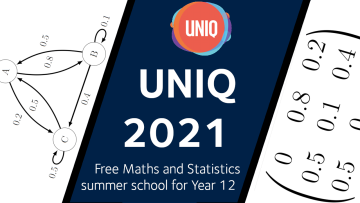12:00
12:00
Phase Analysis for a family of stochastic reaction-diffusion equations
Abstract
We consider a reaction-diffusion equation of the type ∂tψ=∂2xψ+V(ψ)+λσ(ψ)W˙on (0,∞)×?, subject to a "nice" initial value and periodic boundary, where ?=[−1,1] and W˙ denotes space-time white noise. The reaction term V:ℝ→ℝ belongs to a large family of functions that includes Fisher--KPP nonlinearities [V(x)=x(1−x)] as well as Allen-Cahn potentials [V(x)=x(1−x)(1+x)], the multiplicative nonlinearity σ:ℝ→ℝ is non random and Lipschitz continuous, and λ>0 is a non-random number that measures the strength of the effect of the noise W˙. The principal finding of this paper is that: (i) When λ is sufficiently large, the above equation has a unique invariant measure; and (ii) When λ is sufficiently small, the collection of all invariant measures is a non-trivial line segment, in particular infinite. This proves an earlier prediction of Zimmerman et al. (2000). Our methods also say a great deal about the structure of these invariant measures.
This is based on joint work with Carl Mueller (Univ. Rochester) and Kunwoo Kim (POSTECH, S. Korea).
Superdiffusive limits for deterministic fast-slow dynamical systems
Abstract
In this talk, we will consider multidimensional fast-slow dynamical systems in discrete-time with random initial conditions but otherwise completely deterministic dynamics. The question we will investigate is whether the slow variable converges in law to a stochastic process under a suitable scaling limit. We will be particularly interested in the case when the limiting dynamic is superdiffusive, i.e. it coincides in law with the solution of a Marcus SDE driven by a discontinuous stable Lévy process. Under certain assumptions, we will show that generically convergence does not hold in any Skorokhod topology but does hold in a generalisation of the Skorokhod strong M1 topology which we define using so-called path functions. Our methods are based on a combination of ergodic theory and ideas arising from (but not using) rough paths. We will finally show that our assumptions are satisfied for a class of intermittent maps of Pomeau-Manneville type.
16:00
Algebraic branch points at all loop orders from positive kinematics and wall crossing
Abstract
Linear-Quadratic Stochastic Differential Games on Directed Chain Networks
Abstract
We present linear-quadratic stochastic differential games on directed chains inspired by the directed chain stochastic differential equations introduced by Detering, Fouque, and Ichiba in a previous work. We solve explicitly for Nash equilibria with a finite number of players and we study more general finite-player games with a mixture of both directed chain interaction and mean field interaction. We investigate and compare the corresponding games in the limit when the number of players tends to infinity.
The limit is characterized by Catalan functions and the dynamics under equilibrium is an infinite-dimensional Gaussian process described by a Catalan Markov chain, with or without the presence of mean field interaction.
Joint work with Yichen Feng and Tomoyuki Ichiba.
14:00
Algebraic multigrid methods for GPUs
Abstract
Computational science is facing several major challenges with rapidly changing highly complex heterogeneous computer architectures. To meet these challenges and yield fast and efficient performance, solvers need to be easily portable. Algebraic multigrid (AMG) methods have great potential to achieve good performance, since they have shown excellent numerical scalability for a variety of problems. However, their implementation on emerging computer architectures, which favor structure, presents new challenges. To face these difficulties, we have considered modularization of AMG, that is breaking AMG components into smaller kernels to improve portability as well as the development of new algorithms to replace components that are not suitable for GPUs. Another way to achieve performance on accelerators is to increase structure in algorithms. This talk will discuss new algorithmic developments, including a new class of interpolation operators that consists of simple matrix operations for unstructured AMG and efforts to develop a semi-structured AMG method.
A link for this talk will be sent to our mailing list a day or two in advance. If you are not on the list and wish to be sent a link, please contact @email.
14:00
The bubble transform and the de Rham complex
Abstract
The bubble transform was a concept introduced by Richard Falk and me in a paper published in The Foundations of Computational Mathematics in 2016. From a simplicial mesh of a bounded domain in $R^n$ we constructed a map which decomposes scalar valued functions into a sum of local bubbles supported on appropriate macroelements.The construction is done without reference to any finite element space, but has the property that the standard continuous piecewise polynomial spaces are invariant. Furthermore, the transform is bounded in $L^2$ and $H^1$, and as a consequence we obtained a new tool for the understanding of finite element spaces of arbitrary polynomial order. The purpose of this talk is to review the previous results, and to discuss how to generalize the construction to differential forms such that the corresponding properties hold. In particular, the generalized transform will be defined such that it commutes with the exterior derivative.
A link for this talk will be sent to our mailing list a day or two in advance. If you are not on the list and wish to be sent a link, please contact @email.


